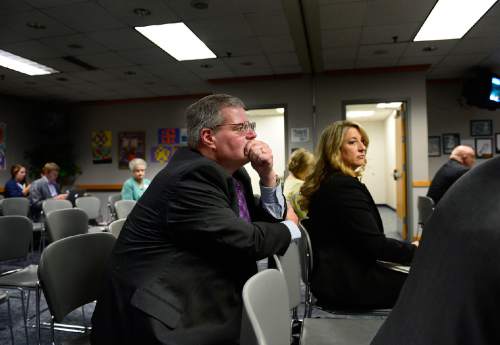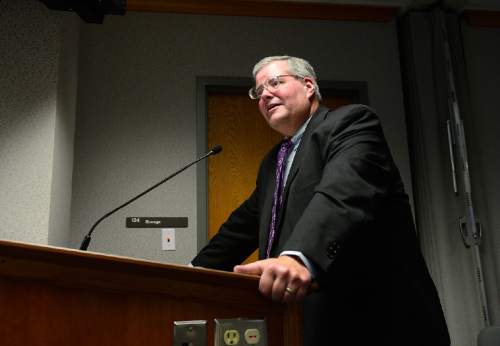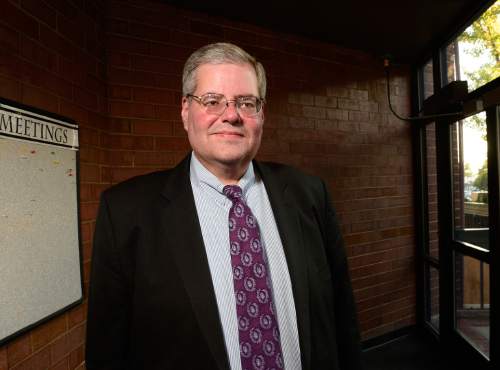This is an archived article that was published on sltrib.com in 2014, and information in the article may be outdated. It is provided only for personal research purposes and may not be reprinted.
A divided state school board picked Ogden School District Superintendent Brad Smith on Friday to lead Utah's public schools, choosing a controversial figure criticized by many of his employees but beloved by school reformers.
Smith received eight votes in favor, the minimum required for board actions. He expects to start work in early November.
The lessons he's learned in Ogden will carry into the tasks ahead of him at the State Office of Education, Smith said Friday. His challenge as state superintendent is to identify areas of brilliance, he said, and to ignite brilliance where it doesn't exist.
"Ogden, when I took it over, was a low-performing district and we needed to reform everything," he said. "That learning is directly applicable."
Smith, then working as an attorney, joined the Ogden School District's board in 2007. He clashed with the local teachers union, bypassing the organization and collective bargaining by requiring teachers to sign individual contracts for the 2011-12 school year.
His fellow board members picked Smith to lead the district three years ago after a closed meeting and without conducting a search for other candidates. He launched a series of changes, including demoting principals at under-performing schools and cutting jobs for reading coaches and library media specialists to save money.
Supporters say Smith's tactics have worked — high school graduation rates have improved and test scores at some of the lowest-performing schools in the state have gone up.
That history might explain the nearly even split on the 15-member state Board of Education. Eight board members supported his appointment, based on the call for yes votes, which means the remaining seven would have voted no or abstained. Their votes were not tallied.
No discussion was held at the time of the vote. But board member and search committee chairman Jefferson Moss said he was impressed with Smith's passion for the children of Utah and his successful leadership in Ogden School District, which is among the most racially and economically diverse in the state.
"He's been able to do some things in a tough area," Moss said. "I think he's turned things around and we felt strongly that he would be able to continue to do that at the state level."
Friday's vote came one day after the final four candidates, all men, were interviewed by the board.
Moss said that between 20 and 25 candidates were considered. He declined to provide specific numbers but said the candidate pool included several women and minority applicants.
"I think we did, at least in my opinion, a good job of going through a very thorough vetting process — multiple rounds of screening and two rounds of interviews," he said.
Smith's tenure in Ogden has been marked by highs and lows. He orchestrated a number of controversial decisions, including relying heavily on student data tracking and trimming supplementary district programs.
During his final interview with the board, Smith acknowledged that his administrative style has, at times, made him unpopular with educators.
But, he said, Ogden School District had been too complacent in the past and he was prepared to accept criticism in the pursuit of improvement.
"Our performance was not acceptable," Smith told the board. "It was not acceptable for my children, my personal children, and it was not acceptable for my 12,000 children. It just wasn't."
Lisa Vipperman, a former Ogden educator who served in the leadership of the Ogden Education Association, said she was "horrified" at the prospect of Smith leading the state's public school system.
She took offense at Smith's characterization that Ogden educators were accepting of failure. "We did everything we could short of standing on our heads," she said. "And I would have done that if I thought it would have helped."
Vipperman taught in Ogden for 14 years before leaving in 2013 to teach in Davis County. She said morale went "down the toilet" when Smith joined the district.
"I gave up my so-called tenure to get away from there because it was killing me," she said.
But Travis Ellis, an Ogden parent, said he has been pleased with Smith's leadership and that Ogden's loss will be Utah's gain.
He said he's seen a greater focus on student achievement in recent years and that improvement sometimes comes at the expense of traditional practices.
"Change is always painful," Ellis said. "Brad (Smith) is driving that change."
Ellis said he still hears concerns from teachers and other parents about Smith's leadership. But he added that the district was mired behind the rest of the state for too long under conciliatory leaders.
"It's not about everyone feeling good," he said. "It's about fixing it so our kids can have a world-class education."
Smith's selection follows a summer of turmoil for the board and the state office. Previous superintendent Martell Menlove resigned in August, retiring earlier than he had planned. Deputy State Superintendent Brenda Hales also departed, opting to use vacation and other leave until her resignation becomes official at the end of the year.
While Hales said no single event led to her decision, board chairman David Crandall has acknowledged it likely was influenced by the closure of an August audit committee meeting that excluded both Menlove and Hales.
Board member Terryl Warner later called for an independent investigation into board actions, questioning that closure, citing other closed meetings and alleging misuse of power. She contended board leaders inappropriately appointed Interim State Superintendent Joel Coleman, who simultaneously holds the position of superintendent of the Utah Schools for the Deaf and the Blind.
Describing himself as a non-educator, Smith said the board made an unconventional choice. But, he said, he has a strong relationship with Odgen's teachers union and he looks forward to cultivating that relationship with stakeholder groups throughout the state.
"We have a position of strong respect where we can work together and when we disagree we disagree openly and transparently and vigorously," he said. "I have an anticipation that we would be able to do the same thing with any group."







